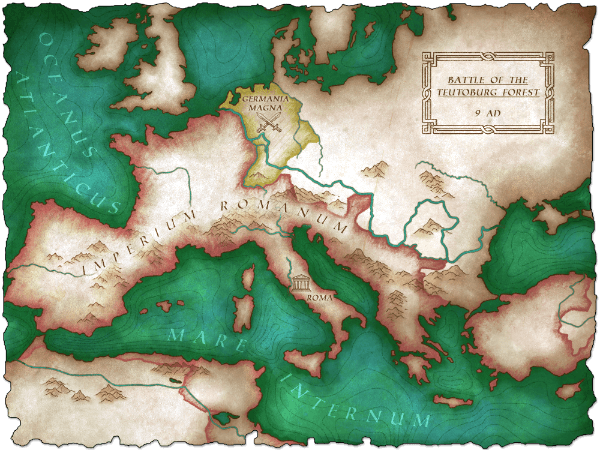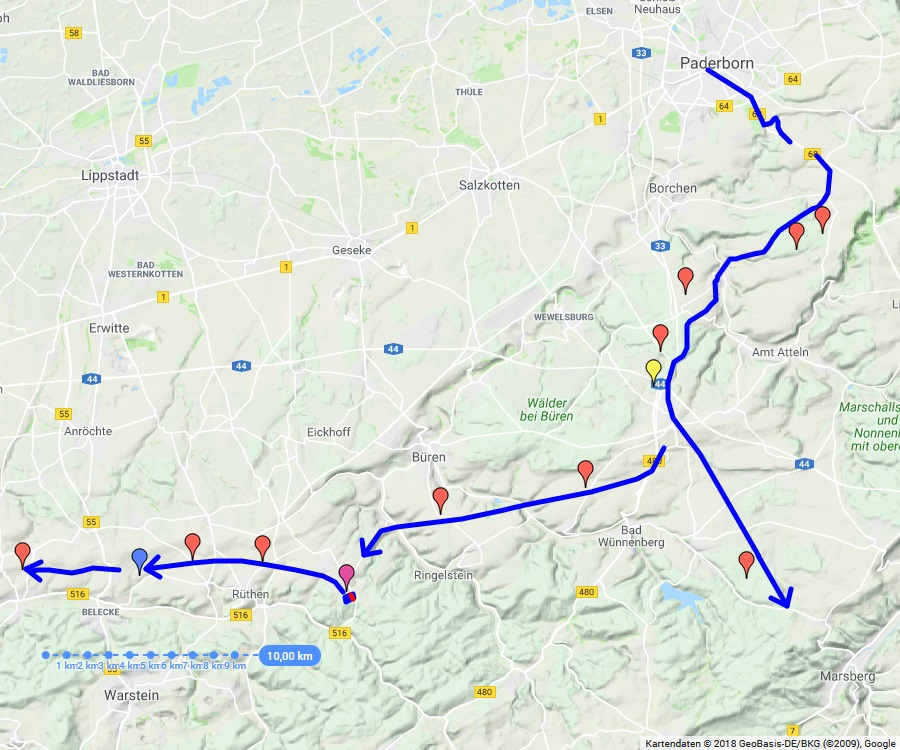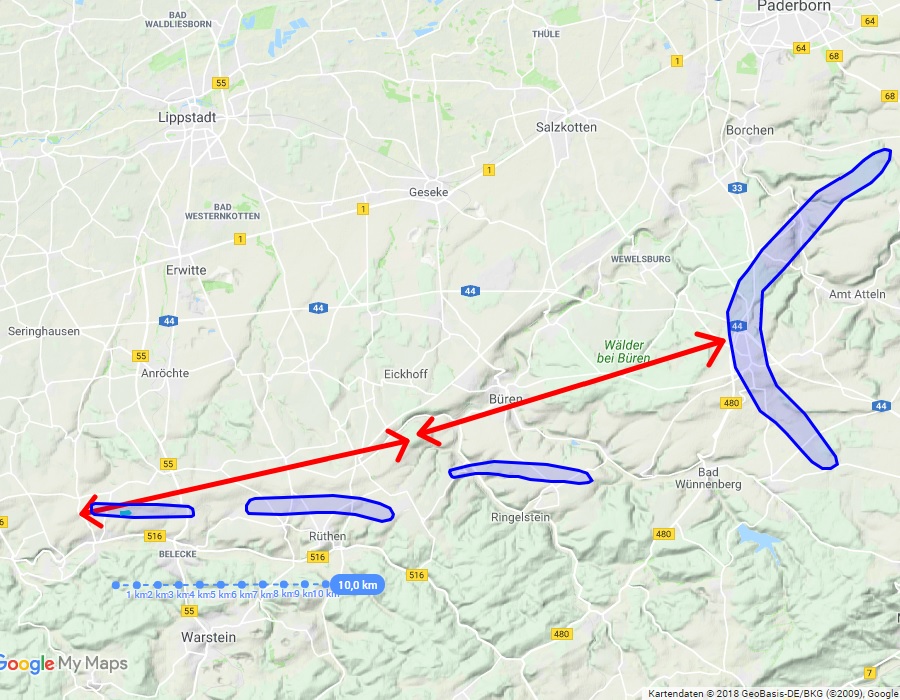Battle of the Teutoburg Forest
Quote
“Tell me that and we’ll go. Right now. Save ourselves and leave this place to burn. Tell me that’s how you want your story to go and we’ll write it straight across the sand.” ― Alwyn Hamilton, Rebel of the Sands
Introduction
The Battle of the Teutoburg Forest took place in the year 9 AD, and it's a battle that keeps historians busy to this day. By employing smart tactics, using the weather and environmental conditions to their advantage, and not least through treason, a bellicose group of Teutonic tribes annihilated three legions of the highly disciplined army of the Roman Empire.
The Roman legions were feared for their discipline, their heavy weaponry, and their sophisticated, well-trained battle formations. In contrast, the Teutonic group of warriors knew nothing of the Roman legions' discipline. This makes the success of the Teutonic tribes in the Battle of Teutoburg Forest even more remarkable: A loose alliance of Teutonic warriors under the leadership of Arminius achieved victory over three battle-hardened legions of the Roman Empire.
Background
Sixty years after Cesar defeated the Gaul tribes and conquered all of Gaul for Rome, and Rome was changed beyond recognition. Following a civil war, the republic became an empire. The senate was deprived of its former power and under Emperor Augustus, Rome's rule reached from the European Atlantic coast all the way to the Black Sea, and from the Channel and the North Sea to Africa, north of the Sahara Desert and down the River Nile to what is today called Sudan.
In the north, the Roman sphere of influence extended across northern Germania, from the River Rhine to the mouth of the Elbe. While Augustus viewed the land as a Roman province, many Teutonic tribes in the area only succumbed to the Roman claim of power reluctantly. Some tribes defied Roman rule, while others, like the Cherusci, accepted Rome's claim and sent children of their aristocracy to Rome as hostages.
This allowed the conquered territories to become familiar with the Roman way of life, to demonstrate Rome's power and eventually, to integrate the new land into the empire. The hostages received training and jobs in the Roman army, and were able to attain glory and status. Young Arminius, son of Seginer, a chieftain of the Cherusci, who lived in the middle reaches of the River Weser, also followed this path.
To enhance Rome's influence in Germania, assert the empire's claim over the territory, and of course to fill the Roman state's coffers, Emperor Augustus sent his experienced public administrator Publius Quintillius Varus. By his side, Arminius was tasked with advising the commander, patrolling the area, and negotiating with the native population.
Already during his previous posts in what are today Egypt and Syria, Varus proved himself to be an efficient, yet cruel administrator of the regions under his management. His job now was to turn Germania Magna into a real Roman province and he pursued that task with an iron fist. Arminius accompanied him as an adviser familiar with the territory. He was raised in the Roman way and had made a career for himself in the legion. He was a cavalier (eques) and led a troop of riders; this meant he had the highest rank in the Roman military that a non-Roman could achieve. Varus seemed to have trusted the Teuton – a mistake that eventually would cost his head.
Treason
What finally led Arminius to his actions can no longer be ascertained: A revolt against the cruel treatment by Rome could have been the reason, as much as the hope for glory, power, and a career among the Teutonic tribes. What is clear is that Arminius lured his commander and superior into a deadly trap.
Arminius must have planned this battle and coordinated the huge number of warriors well in advance, since the Teutons were not known for maintaining standing armies. It seems likely that he negotiated with the different tribes during all of his expeditions to organize the ambush. This didn't occur without mistakes:
Roman sources report that the Teutonic tribal chief Segestes had warned Varus about the sinister plans of his leading scout. Varus didn't believe any of this. He thought this to be an intrigue between Teutonic chiefs. It wasn't a far-fetched thought, since Arminius was Segestes' son-in-law. But the marriage between him and Segestes' daughter, Thusnelda, took place without the consent of the bride's father.
The Battle
Hills of Bone
Characters
Gods
Æsir
- ~ Tamfana -- Germanic Fey Goddess
- ~ Godeliva -- Scion of Tamfana
- ~ Freyja -- Goddess of love, fertility and death
Theoi
- ATHENA ~~ Goddess of Heroes, Law, Strategy & Wisdom
- HADES -- God of the Underworld
- MOROS -- God of Doom
- KERES -- Goddesses who personified violent death and who were drawn to bloody deaths on battle fields
- Hellhounds -- Supernatural Dogs of War
- Spartae -- Malevolent spirit born from violence. Spartae are normally depicted as a skeletal being with some form of a weapon and military attire.
Demigods
Divine Heroes
- ~ Cercyon -- God of Fire & Forge
- ~ Mors
- ~ Morpheus -- One of the Oneroi, gods of dreaming and sleep, he is the master of the mortal form.
- ~ Miko -- Morpheus' most cherished love and also a ghul.
- ~ Þórormr
Supernatural Creatures
- Banshee -- A Wailing Woman (Originally known as Ban Sidhe...sounds the same.)
- Baobhan Sith -- A female vampire, not of Caine's brood.
- Berserkers -- Warriors who bind themselves to animal remains in order to fight with bestial fury. (Cults = Bear, Wolf & Wild Boar)
- Dracolich -- The Undead dragon {Sárkány}.
- Draugr -- Norse Undead
- Ljósálfar --
- Panes -- Creatures of the forest with the heads and torsos of men, the legs and tails of goats, goatish faces and goat-horns.
- Pitys -- A pine Nymph {Eirene}
- Laestrygonians -- Man-eating giants
- Spartae -- Malevolent spirit born from violence. Spartae are normally depicted as a skeletal being with some form of a weapon and military attire.
- Valkyrie -- A host of female figures who choose those who may die in battle and those who may live. {Hrund}
- Vanargand -- Monstrous wolves
Druids
- ~ Odila des Marsi -- Celtic Hierophant {Deceased}
- ~ Gwrtheyrn -- Druid & Kinfolk
Werewolves
- ~ Theotman -- Werewolf Thurge
- ~ Cunobelinus -- Ahroun
- ~ Drust -- Second of Theotman's Bloodbrothers
Generals
Chieftains
- ~ Gundhram -- He who hold Morpheus as a slave.
- ~ Chariovalda
- ~ Adolphus
- ~ Hrotsuitha (mother & seer)
- ~ Hailwic (plump wife)
- ~ Gunda (skinner wife)
- ~ Sigihard
- ~ Godascalc
- ~ Erhard
- ~ Heimirich
- ~ Waldomar
- ~ Segestes --
- ~ Sigdag -- Chieftain of Wunnenburg
Soldiers
- ~ [[]]
- ~ [[]]
Mercenaries
- ~ Schattenhaft
- ~ [[]]
Civilians
- ~ Cleon the Elder
- ~ [[]]
- ~ [[]]
- ~ Warduz
Seers of Chronos
- ~ [[]]
- ~ [[]]
Sources
https://en.wikipedia.org/wiki/Battle_of_the_Teutoburg_Forest
https://www.alisonensis.de/EN/A%20Teutoburg%20Forest%20Battle/A%20Teutoburg%20Forest%20Battle.html


